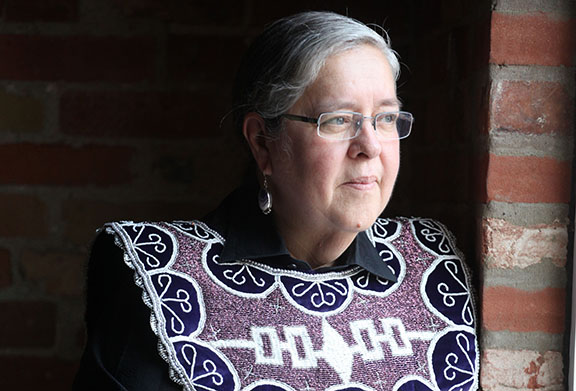Provincial federation of friendship centres publishes new book
 By Sam Laskaris
By Sam Laskaris
TORONTO – The Ontario Federation of Indigenous Friendship Centres (OFIFC) now has a new way to show off its accomplishments.
The group had a virtual book launch on Mar. 30 for Finishing The Sweetgrass Braid.
The book, which is available for pre-order now at https://goodminds.com/products/finishing-the-sweetgrass-braid, is a collection of knowledge and teachings from the friendship centre movement.
The book includes information on what Indigenous knowledge is passed down, how it is shared through urban Indigenous communities and its significance for future generations.
The book was co-written by Sylvia Maracle and Aleksandra Bergier. Maracle served as the executive director of the OFIFC for 42 years before retiring in 2021. And Bergier works at Queen’s University in Kingston, as a research advisor in Indigenous initiatives.
The book has been several years in the making. It was back in the fall of 2013 that OFIFC officials had applied for a Social Sciences and Humanities Research Council (SSHRC) grant.

That funding was to be used for a multi-year project, including the creation of a book, which ended up being Finishing The Sweetgrass Braid.
During the virtual launch, Maracle read passages including her hope of the book.
“I hope that because the federation picked up the responsibility to recover, share and apply Indigenous knowledge that we’ve been able to meaningfully impact the lives of thousands of individuals,” she said.
The OFIFC represents 29 friendship centres in towns and cities throughout the province.
“I believe our work has reached a number of different sectors – health access sectors, housing support, healing lodges, community services for children and youth and many others,” Maracle said. “We’ve been busy braiding our cultural knowledge, values and practice together and trying to transfer not only what we have learned to our community members who came through our doors but also to Indigenous and non-Indigenous partners we create relationships with, non-profit organizations, provincial and federal government agencies, educators, corporations, foundations and other collaborators.”
Maracle said OFIFC reps had documented group information in the past. The OFIFC was founded in 1971.
But a book about the federation had not been written before now because a research grant had never been previously sought before the SSHRC one.
“And if you go way back in the history of friendship centres and urban development, you’ll find that we were always doing things from a cultural perspective,” Maracle said. “We just didn’t realize it was a cultural perspective and we couldn’t articulate it as one.”
The book has now changed that.
“This was a logical conclusion for us, that we had the opportunity to say in a bigger way and in a different venue to actually publish things,” Maracle added. “And there are two thoughts whether we should document this stuff and share it with the world.
“It used to be, when we got traditional teachings, we weren’t allowed to take notes. But we’ve come a long way saying we don’t have enough traditional teachers and we have to get the messages out there.”
Bergier is pleased Finishing The Sweetgrass Braid is now complete.
“I think the book also speaks to the kindness and generosity of the knowledge keepers and community members who decided this is the right time to share some of this wisdom more broadly with the world,” she said. “And the book is full of quotes from Elders and it is full of stories about people who are beloved teachers in the friendship centre movement.”
OFIFC’s chief executive officer Gertie Mai Muise is also thrilled with the publication of the book.
“The book reveals how this work is about the people and a search that knowledge transfer lives within our communities through every day good living,” Muise said. “The book is a culmination of the care and effort by many people who have come together to preserve Indigenous ways of being, knowing and doing.”


